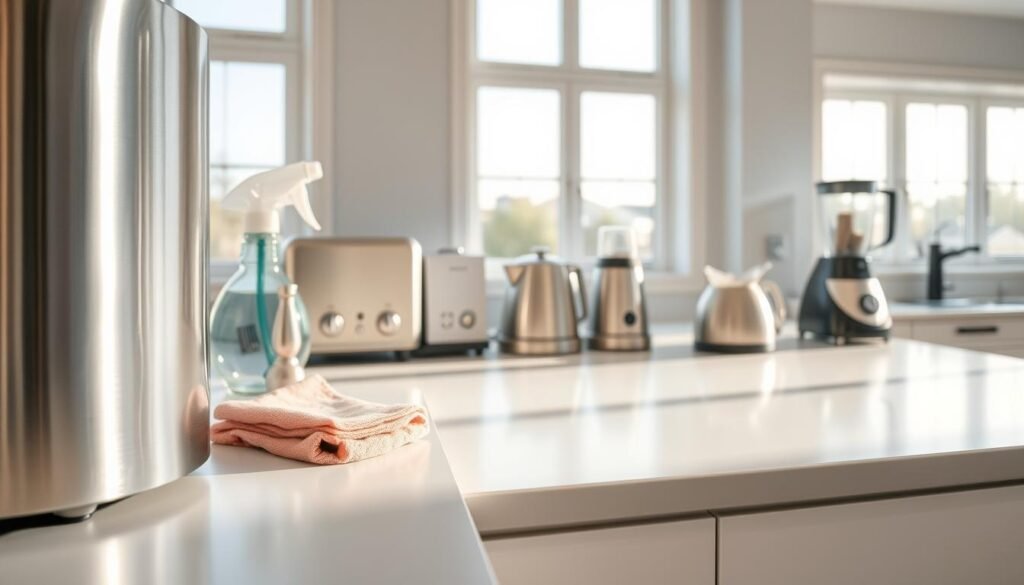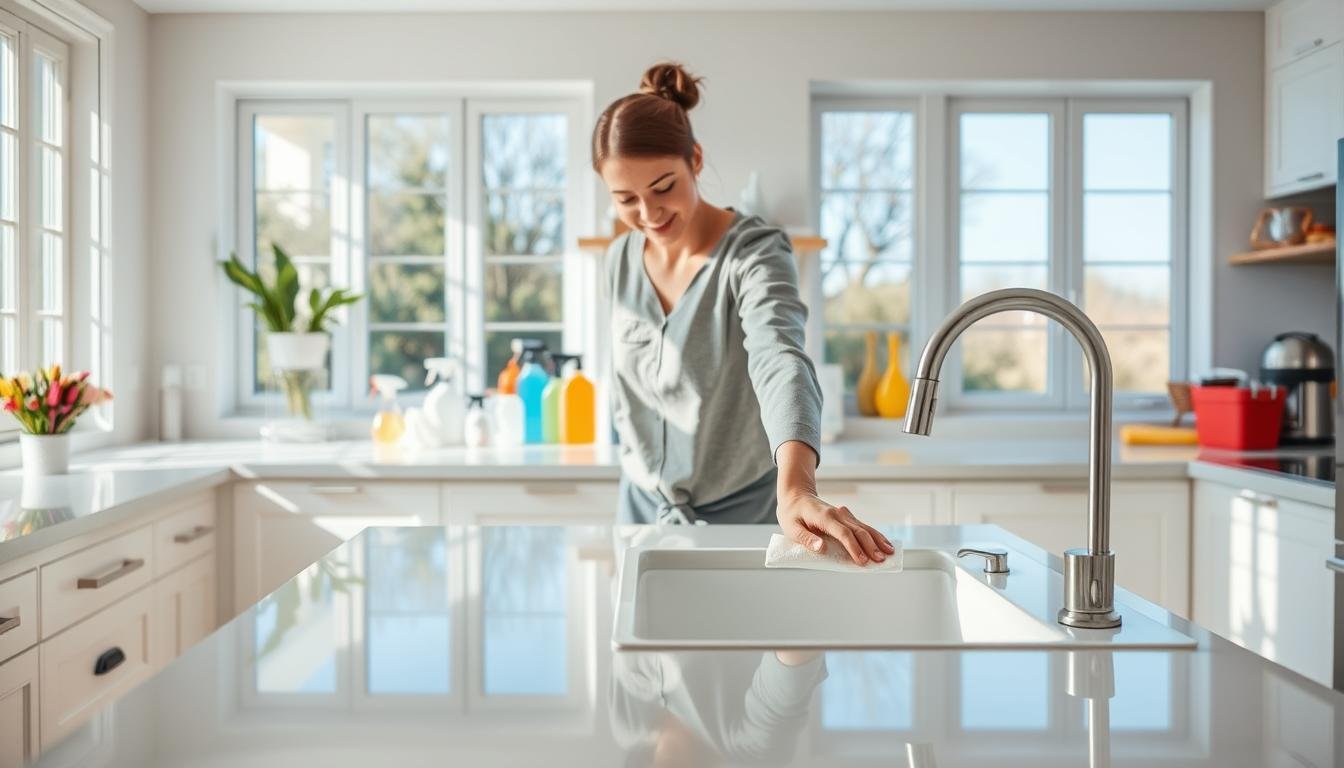Keeping your home in top shape goes beyond aesthetics. Routine maintenance tips are essential for ensuring your furniture and appliances perform at their best while saving you time and money. By following routine maintenance tips, you can prevent issues like mold, dust buildup, and costly repairs, ensuring everything in your home runs smoothly.
For example, cleaning refrigerator coils can improve efficiency, lowering energy bills1. Similarly, wiping down surfaces and removing grime from appliances like ovens and washing machines enhances their performance and extends their lifespan. A well-maintained home is also healthier, reducing allergens and bacteria2.
We believe proactive care is the best way to protect your investments. In the following sections, we’ll share practical tips and step-by-step guides to help you achieve a cleaner, more efficient home.
Key Takeaways
- Routine maintenance improves appliance efficiency and reduces energy costs.
- Cleaning prevents mold, dust buildup, and costly repairs.
- Proactive care extends the lifespan of furniture and appliances.
- A clean home promotes better health by reducing allergens and bacteria.
- Simple solutions like vinegar and baking soda can tackle tough grime.
Understanding the Impact of Clean Appliances on Home Efficiency
Efficiency and health start with well-maintained appliances and surfaces. A clean home isn’t just about appearances; it’s about creating a space that works better for you. From reducing energy bills to improving air quality, the benefits are undeniable.
Enhanced Energy Efficiency and Lower Utility Bills
Regular maintenance prevents dirt and grime from clogging vital components. This ensures appliances run smoothly and last longer. A clean oven heats food faster, reducing cooking time and energy use3.
Healthier Environment and Reduced Allergens
Using eco-friendly solutions like vinegar and baking soda removes residue without harmful chemicals. This protects your family and the environment4.
We believe that a clean home is a happy home. By investing a little time in maintenance, you can enjoy significant benefits. From lower costs to better health, the rewards are worth it.
How Regular Cleaning Can Extend the Life of Your Furniture and Appliances
A little effort today will save you time and money in the long run. By keeping your appliances and surfaces in top condition, you can avoid costly repairs and ensure they last longer. Proactive care is the key to maximizing their performance and lifespan.
Preventing Wear and Tear with Routine Maintenance
Cost Savings Through Proactive Cleaning
Neglecting maintenance often leads to higher repair costs. Appliances that are cleaned regularly operate up to 30% more efficiently than those that accumulate dirt and dust6. This efficiency translates to lower energy bills and fewer breakdowns.
We believe that investing time in maintenance now can lead to significant savings later. By following these simple tips, you can protect your home’s essentials and enjoy their benefits for years to come.
Step-by-Step Guide to Cleaning Common Home Appliances
Maintaining your home appliances doesn’t have to be overwhelming. With a clear plan, you can keep them in top condition and ensure they perform efficiently. Below, we’ve outlined easy-to-follow steps for cleaning some of the most frequently used appliances in your home.
Refrigerators, Dishwashers, and Washing Machines
Start with your refrigerator. Remove expired food and wipe down shelves with a mixture of warm water and mild soap. Clean door seals to prevent mold growth and ensure proper sealing. This simple step can reduce energy consumption by up to 30%7.
For dishwashers, rinse the filter under running water to remove food particles. Run a cycle with a cup of vinegar to eliminate grease and odors. This improves cleaning efficiency and prevents residue buildup8.
Washing machines benefit from a hot water cycle with vinegar and baking soda. This removes mold and keeps the drum fresh. Clean the gasket monthly to prevent unpleasant odors7.

Ovens, Stoves, and Other Kitchen Appliances
Ovens can be cleaned effectively with a baking soda paste. Apply it to the interior, let it sit overnight, and wipe away grime the next day. For stovetops, remove grates and soak them in soapy water to loosen grease7.
Microwaves often harbor food residue. Heat a bowl of water with lemon slices for a few minutes to loosen dirt. Wipe the interior clean with a damp cloth7.
Address spills immediately to prevent residue buildup. Use natural solutions like vinegar and baking soda for a chemical-free clean. This not only protects your appliances but also your health7.
We believe that a little effort goes a long way in maintaining your appliances. By following these steps, you can ensure they stay efficient, clean, and ready to serve your home for years to come.
Essential Tools and Eco-Friendly Cleaning Techniques
The right tools and eco-friendly methods can transform your cleaning routine. By using natural ingredients and proper supplies, you can maintain a healthy and efficient home while reducing environmental impact.
Must-Have Cleaning Supplies and Natural Ingredients
Every homeowner should have essential tools like microfiber cloths, sponges, and scrubbing brushes. These items enhance cleaning efficiency and reduce the need for disposable products, which contribute to waste9.
Natural ingredients like vinegar and baking soda are powerful cleaners. They remove dirt and grime without harsh chemicals, protecting both your home and the environment. For example, vinegar can dissolve grease, while baking soda tackles tough stains10.
Practical Tips for Grease, Grime, and Residue Removal
Removing stubborn grease and grime can be challenging. A mixture of vinegar and baking soda works wonders for ovens and stovetops. Apply the paste, let it sit, and wipe away the residue for a sparkling clean surface10.
For refrigerators, clean shelves and seals regularly to prevent mold and maintain efficiency. Use a damp cloth with mild soap for quick and effective results10.
We believe that eco-friendly cleaning not only protects your appliances but also extends their lifespan. By investing in the right tools and techniques, you can save time and ensure a healthier home.
“Natural solutions like vinegar and baking soda are safe, effective, and environmentally friendly.”
- Microfiber cloths remove 98% of bacteria using only water9.
- Vinegar and baking soda are non-toxic and biodegradable.
- Regular cleaning prevents mold and improves appliance performance.
DIY Versus Professional Appliance Cleaning Strategies
Deciding between DIY and professional cleaning can impact your home’s efficiency. Both approaches have their benefits, and understanding when to use each can save time, money, and extend the life of your appliances. We’ll explore the pros and cons of hiring experts and share effective DIY methods to keep your home running smoothly.
Weighing the Pros and Cons of Hiring Experts
Professional cleaning services offer expertise and convenience. Experts have the tools and knowledge to tackle tough grime and ensure appliances operate at peak performance. For example, regular maintenance by professionals can extend the lifespan of kitchen appliances by up to 50%11.
However, hiring professionals can be costly. Services may overlap with tasks you can handle yourself, leading to unnecessary expenses. Additionally, 60% of appliance damage is attributed to improper cleaning methods or the use of harsh chemicals11. This highlights the importance of choosing reputable services.
Effective DIY Methods to Keep Appliances Running Smoothly
DIY cleaning is a cost-effective alternative that works well for routine maintenance. Simple solutions like vinegar and baking soda can remove grease and mold without harsh chemicals. For instance, steam-cleaning methods for microwaves can reduce food splatter cleanup time by 50%11.

“Natural solutions like vinegar and baking soda are safe, effective, and environmentally friendly.”
| Approach | Pros | Cons |
|---|---|---|
| Professional Cleaning | Expertise, time-saving, thorough cleaning | Higher cost, potential for overlapping services |
| DIY Cleaning | Cost-effective, eco-friendly, routine maintenance | Requires time and effort, may miss deep cleaning |
We believe that a balanced approach works best. Use DIY methods for regular upkeep and hire professionals for complex tasks or when appliances need deep cleaning. This ensures your home remains efficient and your appliances last longer.
Conclusion
Taking care of your space ensures it takes care of you. By maintaining your appliances and surfaces, you can enjoy significant benefits like lower energy bills and improved efficiency. Consistent cleaning prevents costly repairs and extends the lifespan of your essentials12.
A well-maintained home is also healthier, reducing allergens and improving air quality. Simple steps like wiping down surfaces and inspecting seals can make a big difference13. We believe proactive maintenance is the key to a happier, more efficient living space.
Start today by following our detailed guides. For additional support, explore our professional services. Together, we can create a cleaner, healthier home for you and your family.
FAQ
Why is it important to keep appliances clean?
Clean appliances operate more efficiently, saving energy and reducing utility bills. They also create a healthier environment by minimizing allergens and preventing mold buildup.
What are the benefits of maintaining appliances regularly?
Routine care prevents wear and tear, extends lifespan, and avoids costly repairs. It also ensures optimal performance and keeps your home running smoothly.
How often should I clean my refrigerator?
Wipe spills immediately and deep clean every 3-4 months. Focus on coils, seals, and interior surfaces to maintain freshness and efficiency.
What’s the best way to remove grease from kitchen appliances?
Use a mix of baking soda and vinegar for a natural solution. For tough grime, apply a mild dish soap and warm water mixture with a soft cloth.
Can cleaning my washing machine improve its performance?
Yes! Run an empty cycle with vinegar monthly to remove residue and prevent mold. Wipe the drum and seals to keep it fresh and odor-free.
Should I hire professionals for appliance cleaning?
Professionals offer deep cleaning and expertise, especially for complex issues. However, DIY methods with proper tools can maintain appliances effectively between services.
What tools are essential for appliance maintenance?
Keep microfiber cloths, a soft brush, baking soda, vinegar, and a gentle cleaner on hand. These tools tackle dust, grease, and residue without damaging surfaces.
How does cleaning appliances save money?
Efficient appliances use less energy, lowering bills. Preventative care reduces the need for repairs, saving on costly replacements in the long run.




